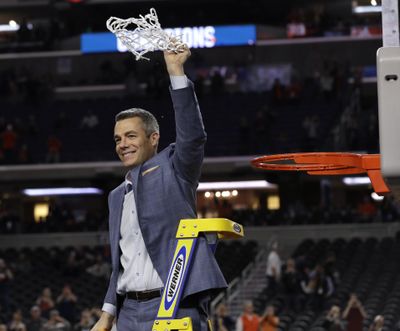Shawn Windsor: The absence of March Madness and other sports is exactly what we need

INDIANAPOLIS – They ran onto the floor in a silent arena, a few of the Michigan basketball players turning to the empty seats and raising their arms and jumping, pretending they were responding to a packed house.
It was maybe 20 minutes before UM’s game against Rutgers in the Big Ten tournament Thursday as the Wolverines were settling into their warm-up routine. A few minutes later, they left the court, after they’d been told the Big Ten canceled the rest of its games.
A few minutes after that, the public address announcer read a statement released by the league.
“The main priority continues to be the health, safety and wellness of our student-athletes, coaches, administrators, fans and media,” said the announcer, speaking with the booming, professional cadence of someone trying to connect with a crowd of thousands.
Give him credit; his voice filled the emptiness.
But what’s going to fill the void left by sports?
Because soon after the Big Ten shut down its tournament, other conference tournaments did the same, followed by the NHL suspending its season and Major League Baseball delaying the start of its. All of this coming less than 24 hours after the NBA suspended its season.
In the last two days – almost by the minute – one organization after another announced plans to keep large groups of people from gathering in tight spaces, including the NCAA itself, which decided late Thursday afternoon to cancel all remaining spring and winter championships in wake of the novel coronavirus pandemic.
It’s not hard to see the momentum carrying over from sports to entertainment to congregating of any kind.
Already high schools and universities are scuttling in-person classes in favor of online studies and companies across the country are encouraging employees to work remotely.
So, again, what’s going to fill our time without sports? What other refuge will we seek?
Juwan Howard, Michigan’s coach, suggested that we retreat to our fundamental relationships and help keep one another safe.
“We need to stay bonded together during this time,” he said in a statement after the cancellation of the game. “We want everyone to stay safe and take precautions to protect yourselves and loved ones.”
In a time when empathy is hard to come by and everything is framed through the lens of hyper-politicization, maybe the absence of sports will remind us we still share common interests beyond rooting interests for a team.
Or a political party.
It won’t be easy. Even now, after all the cancellations, too many of us are writing this off as a hoax, or as a conspiracy led by the media, ignoring the words of those who’ve made the study of public health and infectious disease their life’s work.
By cancelling games, the administrators in charge of our sports leagues – both professional and collegiate – are telling us to think beyond the three feet of earth we occupy at any given time. Yes, coronavirus doesn’t kill everyone it touches. Not even close.
But that isn’t the point. It spreads easily. It’s more deadly than the flu. And if something hadn’t been done to help contain it – President Trump is banning travel from Europe for non-Americans – the virus would more easily find those who can’t survive infection.
In other words, the sports world is showing us how we can all do our part. Because it’s going to take all of us to keep this from getting out of control and overwhelming our hospitals.
Yes, we will miss watching college basketball and pro basketball and hockey and baseball. We will miss seeing concerts. Or attending conventions. Or watching the opera.
We will miss gathering in ways large and small as we spend the next month or more distancing ourselves from one another. That’s unsettling, just as the scene at Bankers Life Fieldhouse was Thursday morning, watching two teams try their best to take the court in an empty arena and pretend everything was normal.
Well, it wasn’t.
And this isn’t. It’s a pandemic. And while it’s easy to get carried away – I couldn’t help but think I was in a disaster movie as I drove to the arena – it’s still better than the alternative.
Is it possible that this is an overreaction?
Not if you look at the spike in cases in the U.S. the last week, and then think about what’s happened in Italy, where nearly 200 people died in a 24-hour period. Yet even if you insist it’s an overreaction, what’s the real harm? And isn’t the trade-off for caution worth it?
Kevin Warren, the Big Ten commissioner, addressed that thought when he addressed the media at Bankers Life Fieldhouse:
“It’s really important that we’re thoughtful and if it comes down that I overreacted – or we overreacted – I’m comfortable with that.”
Warren said he was confident in his decision. He said that when life gets complicated, the best answer if often the simplest one.
That is what has happened this week in the sports world. Shut it down and live to play another game, another day.
Sports will return eventually. The decision to shut down games means we can get back to them sooner than if everybody had kept playing.